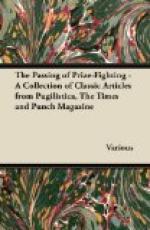Then Paris murmured:—
“Honourable
but vague,
Remote, but honourable, my purpose is:”
And that great River-god arose in flood,
Monstrous, and murmuring, and to the main.
He swept the works of men and oxen down,
And had not Paris climbed into a tree,
He ne’er had crossed the ocean;
never seen
The fairest face that launched a thousand
ships,
And burned the topless towers of Ilium.
Some accused LEGION of plagiarising the last line and a half, which reminded them, they said, of MARLOWE. But he replied that great wits jump, that it was an accidental coincidence. The public, which rarely cares much for poetry, was struck by Cebren and Paris. “There is in it,” said the Parthenon, “an original music, and a chord is struck, reverberating from the prehistoric years, which will find an answer in the heart of every father of a family.” The Clergy at large quoted Cebren and Paris in their charges and sermons, and the work was a favourite prize at seminaries for young ladies. Consequently all the other poets, whom nobody buys, arose, and blasphemed Cebren and Paris in all the innumerable reviews. This greatly, and justly, added to the popularity of LEGION’s book. He followed it up by Idylls of the Nursery, a volume of exquisite pieces on infants as yet incapable of speaking or walking. This had an enormous success among young newly-married people, an enthusiastic class of the community. At recitations you might hear—
Tootsy, wootsy, pooty sing,
Mammie’s darling, icky thing!
Coral lips that fret the coral,
Innocence completely moral.
Sweet Babe,
They
say,
Naught rhymes to Babe,
In
any lay
Save “astrolabe,”—
And Tippoo Saib!
Oh, tiny face,
And
tiny feet,
Oh, infant grace,
So
incomplete,
Kiss me, my Sweet!
In sequence to these effusions, LEGION poured forth Ballades, and Rondeaux, and wrote a Chant Royal on a General Election which occupied a whole column of a newspaper, and needed three men to read, with a boy for the “envoy.” But this ditty was not thought to have seriously affected the voting classes in any direction. LEGION was now usually spoken of as “the versatile Mr. LEGION,” a compliment which never failed to annoy him hugely. Sated with popular applause, he turned into a vein of new poetry, and produced The Song of the Spud, which, his admirers averred was “racy of the soil.” A grand English Opera, on the Pilgrimage of Grace, was performed, at immense expense, LEGION being the Librettist. It was patriotic, but not exactly popular. Still, with all these claims on his country, LEGION lived in hopes which were wofully disappointed; for, when his chance came at last, a Prime Minister of modern ideas declared that, as a Laureate is not useful, he must be ornamental. Now, neither LEGION, nor any of his rivals, could




